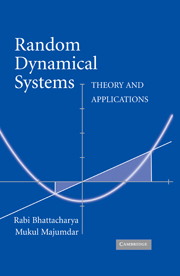Book contents
- Frontmatter
- Contents
- Preface
- Acknowledgment
- Notation
- 1 Dynamical Systems
- 2 Markov Processes
- 3 Random Dynamical Systems
- 4 Random Dynamical Systems: Special Structures
- 5 Invariant Distributions: Estimation and Computation
- 6 Discounted Dynamic Programming Under Uncertainty
- A Appendix
- Bibliography
- Author Index
- Subject Index
Preface
Published online by Cambridge University Press: 20 February 2010
- Frontmatter
- Contents
- Preface
- Acknowledgment
- Notation
- 1 Dynamical Systems
- 2 Markov Processes
- 3 Random Dynamical Systems
- 4 Random Dynamical Systems: Special Structures
- 5 Invariant Distributions: Estimation and Computation
- 6 Discounted Dynamic Programming Under Uncertainty
- A Appendix
- Bibliography
- Author Index
- Subject Index
Summary
The scope of this book is limited to the study of discrete time dynamic processes evolving over an infinite horizon. Its primary focus is on models with a one-period lag: “tomorrow” is determined by “today” through an exogenously given rule that is itself stationary or time-independent. A finite lag of arbitrary length may sometimes be incorporated in this scheme. In the deterministic case, the models belong to the broad mathematical class, known as dynamical systems, discussed in Chapter 1, with particular emphasis on those arising in economics. In the presence of random perturbations, the processes are random dynamical systems whose long-term stability is our main quest. These occupy a central place in the theory of discrete time stochastic processes.
Aside from the appearance of many examples from economics, there is a significant distinction between the presentation in this book and that found in standard texts on Markov processes. Following the exposition in Chapter 2 of the basic theory of irreducible processes, especially Markov chains, much of Chapters 3–5 deals with the problem of stability of random dynamical systems which may not, in general, be irreducible. The latter models arise, for example, if the random perturbation is limited to a finite or countable number of choices. Quite a bit of this theory is of relatively recent origin and appears especially relevant to economics because of underlying structures of monotonicity or contraction. But it is useful in other contexts as well.
In view of our restriction to discrete time frameworks, we have not touched upon powerful techniques involving deterministic and stochastic differential equations or calculus of variations that have led to significant advances in many disciplines, including economics and finance.
Information
- Type
- Chapter
- Information
- Random Dynamical SystemsTheory and Applications, pp. ix - xiiPublisher: Cambridge University PressPrint publication year: 2007
